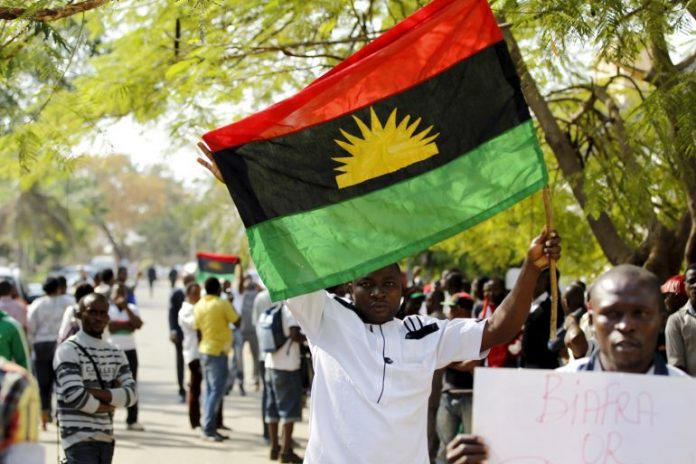By Chijioke Churuba
I will attempt to explain the agitations from the old eastern Nigeria, from scriptural viewpoints and historical perspectives, to see if we could gain some insights and learn few lessons, as admonished in Romans 15:4- where it is written: “For whatever things written aforetime, were written for our learning…”
First, what is an east wind? The written scriptures – especially the Torah symbolically, refer the east wind as a powerful, boisterous wind that alters the ecological, economic or political conditions of a people, or a nation. This view is supported in Exodus 10:13- 15, where the east wind, was used to destroy the ecological and economic capabilities of the Egyptians. In the same Exodus, the east wind was also used, by God to push back the waters of the red sea, to finally liberate his people from the political and economic oppression of the Egyptians. Also, in some secular writings, the east wind is seen, as a signal of change.
But, how can we symbolically relate the wind or the east wind to some of the recent political agitations coming out from the old eastern region of Nigeria? Let’s look again at the scriptures:
In Proverbs 11:29, the scriptures warn that – Whosoever troubles his own house shall inherit or reap the wind. In some other scriptural verses, the east wind is seen to occur as a response to the ‘troubling acts’ of men.
But, are there ‘troubling acts’ in Nigeria? Yes, there are. Nigeria has over the years, troubled its own household – especially, the people of old eastern region.
The country has troubled them and continues to trouble them with injustice, with policies of political exclusion and dichotomy. It troubles them with discrimination and nepotism (lop-sided political appointments). It troubles them with intimidation, neglect and economic repression, etc., and predictably, appears to be reaping from the region – an east wind – in the form of political agitations.
To add insult to injury, the country seems to treat the east wind with scorn, triumphalism and in some cases with suppression and propaganda as astonishingly mentioned in the scriptures- Hosea 12: 1.
But, can the east wind be suppressed? Can it be held down or blown away with intimidation and propaganda? Not according to the scriptures. But, the east wind, could be understood – especially its direction and pattern.
Let’s look at historical pattern. Is there any past related agitation(s) – from the old eastern Nigeria – that largely patterns what, we are witnessing today? Arguably Yes: The Aba Women’s Riot of 1929, was a political event, which shared striking features with the current agitations from the old eastern Nigeria.
It started also from Abia State like the new agitations, and moved quickly to other strategic cities in the present day, Cross Rivers, Akwa Ibom, Rivers and Imo States etc.
It shared the same deep rooted frustrations/sense of political and economic injustice, defiance and vehemence. And had the same large fanatical and suicidal grassroots support – especially among ordinary folks like the current east wind.
The two movements all started in a non–violent manner, and deployed local song singing, crowd dynamics, word of mouth and effective information sharing among people, to quickly mobilize large fellowships. The two also, appeared in the beginning to lack substance, but were deeply organized and directed. Their uncouth and plain way of communication fanatically endeared the two movements to the ordinary folks.
Again, the arrests and loss of lives – energized the two movements and gave them huge political fellowship, sympathy, visibility, bargaining power and international appeal.
It is also important to note that, the Aba Women’s riot of 1929, succeeded to raise the political consciousness of the indigenous people of the old eastern Nigeria. It unified them, gave them a strong voice and platform- which partly laid the foundation for anti- colonial movements – for Nigeria’s independence in 1960. Similarly, the heightened political consciousness raised by the current east wind, is dangerously unprecedented, and stands to be harvested for political purposes.
But, what do we do? It is time to talk. It is time, to allow justice, equity, fairness, reasonableness and political wisdom to take the centre stage. It is time to do away with the negativities: scapegoating, blackmail, propaganda, political intimidation, persecution, bigotry, violence, political and economic repression.
It is time to initiate honest political conversations – that would afford Nigerians the opportunity to truthfully discuss, deliberate and agree on the future of Nigeria.
Let’s us not be deceived. There is an east wind! But, we don’t need to wait for the wind to gather and for the storm to thunder, before we talk. It is time to talk. May be, we may hear ourselves, and save the day!
Mr Churuba, an economist, retired banker and Managing Consultant, Sprog Consulting Limited, wrote in from Port Harcourt.












